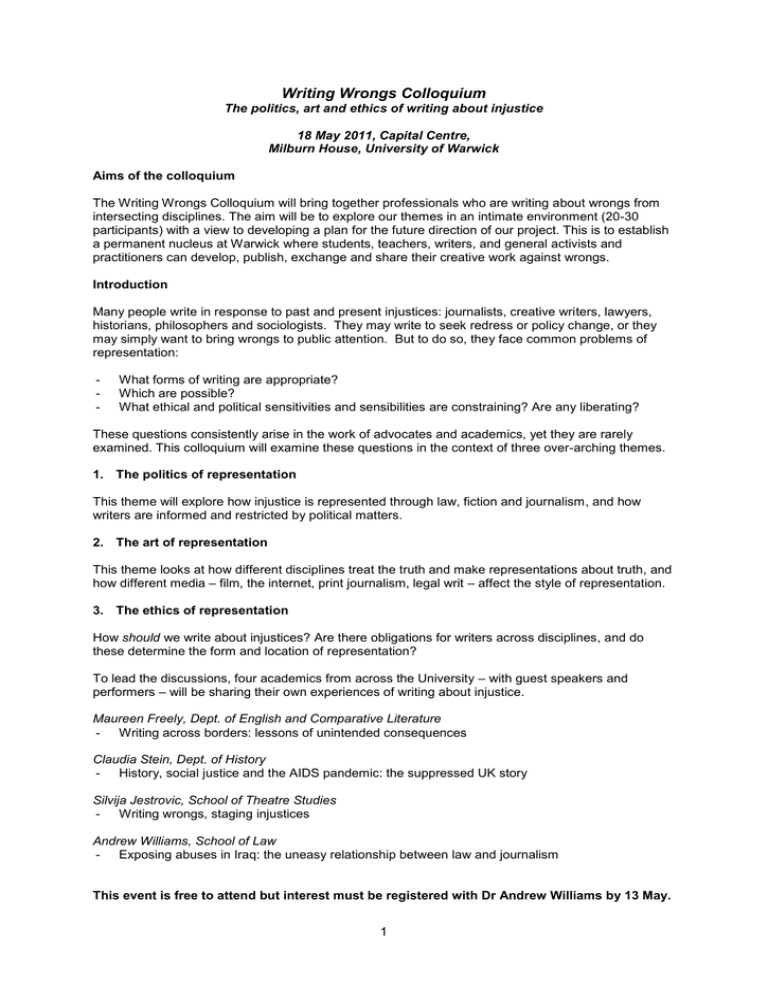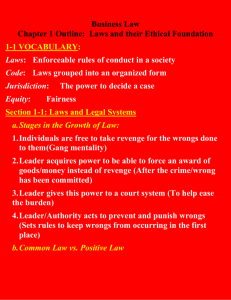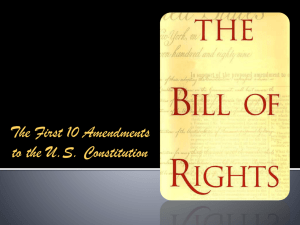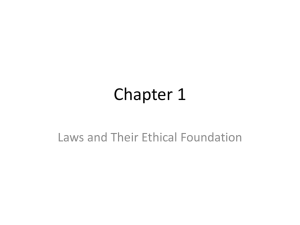Writing Wrongs
advertisement

Writing Wrongs Colloquium The politics, art and ethics of writing about injustice 18 May 2011, Capital Centre, Milburn House, University of Warwick Aims of the colloquium The Writing Wrongs Colloquium will bring together professionals who are writing about wrongs from intersecting disciplines. The aim will be to explore our themes in an intimate environment (20-30 participants) with a view to developing a plan for the future direction of our project. This is to establish a permanent nucleus at Warwick where students, teachers, writers, and general activists and practitioners can develop, publish, exchange and share their creative work against wrongs. Introduction Many people write in response to past and present injustices: journalists, creative writers, lawyers, historians, philosophers and sociologists. They may write to seek redress or policy change, or they may simply want to bring wrongs to public attention. But to do so, they face common problems of representation: - What forms of writing are appropriate? Which are possible? What ethical and political sensitivities and sensibilities are constraining? Are any liberating? These questions consistently arise in the work of advocates and academics, yet they are rarely examined. This colloquium will examine these questions in the context of three over-arching themes. 1. The politics of representation This theme will explore how injustice is represented through law, fiction and journalism, and how writers are informed and restricted by political matters. 2. The art of representation This theme looks at how different disciplines treat the truth and make representations about truth, and how different media – film, the internet, print journalism, legal writ – affect the style of representation. 3. The ethics of representation How should we write about injustices? Are there obligations for writers across disciplines, and do these determine the form and location of representation? To lead the discussions, four academics from across the University – with guest speakers and performers – will be sharing their own experiences of writing about injustice. Maureen Freely, Dept. of English and Comparative Literature - Writing across borders: lessons of unintended consequences Claudia Stein, Dept. of History - History, social justice and the AIDS pandemic: the suppressed UK story Silvija Jestrovic, School of Theatre Studies - Writing wrongs, staging injustices Andrew Williams, School of Law - Exposing abuses in Iraq: the uneasy relationship between law and journalism This event is free to attend but interest must be registered with Dr Andrew Williams by 13 May. 1 Programme 9.30 – 10.00 am Initial Gathering 10.00 – 11.15 Maureen Freely, Dept. of English and Comparative Literature - Writing across borders: lessons of unintended consequences 11.15 – 11.30 Coffee (provided) 11.30 – 12.45 Claudia Stein, Dept. of History - History, social justice and the AIDS pandemic: the suppressed UK story 12.45 – 1.45 Lunch (provided) 1.45 – 3.00 Silvija Jestrovic, School of Theatre Studies - Writing wrongs, staging injustice 3.00 – 3.15 Coffee (provided) 3.15 – 4.30 Andrew Williams, Dept. of Law - 4.30 – 5.30 Exposing abuses in Iraq: the uneasy relationship between law and journalism Discussion Further information Writing across borders: The unintended consequences of international literary activism (Prof. Maureen Freely) International activism in response to perceived wrongs has a rich history, but it has exploded with the advent of the internet. ‘Witnessing’ the wrongs of distant suffering is now almost unavoidable, allowing outrage to transcend national boundaries. Campaigns organised to bring injustice to the attention of people around the world, with perhaps a focus on policy-makers in major powers and institutions, have galvanised writers to contribute to commentary and exposé. But activism aimed at addressing wrongs across borders provokes some serious ethical questions about what and how such injustices can be represented. It can also lead to unintended consequences that pose as many dangers as benefits. History, Social Justice and AIDS Activism (Dr. Claudia Stein) How can the writing of history contribute to achieving social justice today? What are the boundaries between ‘fact’ and ‘fiction’ in critical history, between objective ‘truth’ and ‘subjective’ memory? How vital is history for those forgotten from the mainstream stories produced. These are some of the fundamental questions which will be considered in this segment. It will do so through the lens of AIDS activism in 1980s UK. This represents an example of a forgotten history. While AIDS activism is a well-researched historical topic in other European countries, little has been done in the UK. This is particularly interesting because – unlike other European countries – the British state under Margaret Thatcher reacted extremely slowly to the epidemic. The story of AIDS in the UK is, in fact, the story of activism of individual people and groups that not only changed things in the 1980s/1990s but also, through their actions, considerably shaped the way we live now, the way we think and speak about sexual otherness and injustices occurring in the area of sex and health today. Tragically, these people have not only no ‘history of their own’ but are currently enduring more injustices. If they haven’t died of AIDS, many of them have been unable to work and now face old age poverty without pension and any state support. The case raises many significant questions: Why is there no history of such men and women in UK? And how can one be produced? Is ‘having a history of one’s own’ crucial to having a voice in today’s fight against social injustice in the areas of sexual health? How should or could such a history look like? Is an ‘official’ history of Aids activism possible or even desirable? Does it necessarily have to be written by academic historians only or can we image a consortium of writers, filmmakers, novelist 2 uttering different, even contradicting voices to the plot? Whose voices do we record and make available? What sources do we rely on, keeping in mind that many of the direct witnesses are now dead or very ill? Moreover, due to the privatization of the British state since the 1980s, governmental archives were not only closed or ‘cleaned’ of sources not deemed ‘important’. Writing wrongs, staging injustices (Dr. Silvija Jestrovic) This segment will consist of a set of provocations followed or interspersed with discussion. It will involve 3 or 4 participants – a combination of scholars and artists – and each would be asked to present a provocation (for up to 10 min) specifically addressing one of the outlined themes. Provocations are chosen as a form to deal with the issues of representations. The notion is to consider paradoxes and ambiguities of these endeavours, and debate the following questions: To what extent is efficacy of representation dependant on its aesthetics? What is the relationship between agency and exploitation? Who is writing (performing) and for whom? Uncovering abuse in Iraq: law and journalism (Dr. Andrew Williams) The abuse of detainees is a not so hidden story of the occupation of Iraq by UK forces. Despite government efforts to restrict public awareness of wrongs committed by the Armed Forces, lawyers, journalists and activists have revealed many abuses. This section will examine the uneasy relationship that has developed between these groups and how the politics, ethics and art of representation have impacted on how wrongs in Iraq have been perceived. 3



